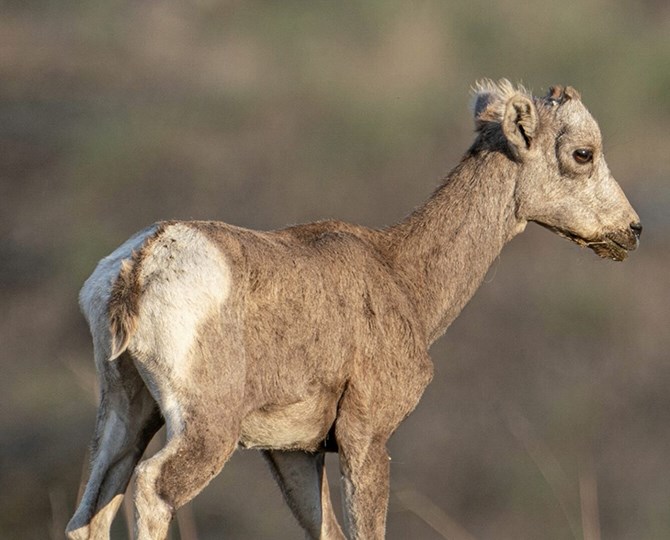
This Bighorn lamb was put down due to its having contracted the deadly mycoplasma ovipneumoniae.
Image Credit: SUBMITTED/ Darryn Epp via Wild Sheep Society of BC
September 21, 2024 - 6:00 PM
The treasured California bighorn sheep herds in the South Okanagan have been an ongoing topic of concern as their populations are declining due to diseases and habitat loss from development.
The sheep are impacted by psoroptes mange and mycoplasma ovipneumoniae, two potentially deadly diseases, and are at risk of contracting fatal chronic wasting disease.
The sheep disease monitoring program that tracks the diseases is one of many provincial fish and wildlife programs in crisis, according BC Wildlife Foundation media release issued Sept. 18.
Wildlife staff with the Ministry of Water, Land and Resource Stewardship are facing a ban on travel in the field and in some departments staff have been asked to turn in their government cell phones as a cost-saving measure after operational budgets were cut by 30 to 70%, according to the wildlife foundation.
“It’s huge, there were early signs in February including travel freezes, then the 2024 budget letter to the ministry didn’t come out, and suddenly we have people who can’t travel and no funding for programs that are already underway,” Jesse Zeman with BC Wildlife Federation told iNFOnews.ca.
The work fish and wildlife staff do requires staff to be on the ground and out in the field. Zeman claimed the constraints are resulting in staff taking stress leaves or abandoning their positions altogether.
“The Okanagan office is down I believe five biologists out of seven, it’s pretty empty now,” Zeman said. “There are people who left the province in the spring who had been working in BC for a long time, they can’t stay in a career where there isn’t funding or support.”
The issues are affecting programs like disease monitoring of herds. Bighorn sheep disease management in the Okanagan has already been cancelled after funding expected to come in is no longer available.
Funding for chronic wasting disease management has been diverted from the provincial Together for Wildlife program, which is intended to promote habitat restoration and wildlife stewardship, not manage disease.
In February, chronic wasting disease was found in two deer in the Kootenay region south of Cranbrook. The disease is caused by infectious agents called prions that effect the central nervous system and is 100% fatal for deer, elk, moose and caribou.
READ MORE: Dog killed by deer in Kamloops part of increase in urban deer conflicts
The disease is highly transferrable and can move across regions with the transport of carcasses or contaminated hay.
“The only way to get a handle on this disease is monitoring the herds, and if it’s suspected, to shoot that animal to test it. The density of those herds with the disease has to be reduced," Zeman said. “With this budget we can’t do that monitoring. It will be done but it’s coming out of a different program, that will then take away from another program.”
READ MORE: DFO concerns about impacts on fish habitat delay Kamloops riverbank cleanups
The new ministry was created a couple of years ago and staff doing fish and wildlife, habitat and water work were slowly transitioned over from the Ministry of Forests.
Zeman said when the fish and wildlife branch was under management of the Ministry of Forests, they did what they could to help, covering some budget shortfalls with contingency funds.
In order to do field work, fish and wildlife staff will need funds from non-government organizations or take money from project funds to cover travel and accommodation costs, he said.
READ MORE: Kettle River forestry investigation raises concerns about logging in watersheds
When staff can’t oversee programs, the programs will get cancelled.
“Fish and Wildlife Branch staff are relying on charity to do their work and that means that research, fish and wildlife inventories, and habitat restoration will not get done,” Zeman said.
The Ministry of Water, Land and Resource Stewardship did not respond to a request for comment from iNFOnews.ca.
— This article was updated at 11:22 a.m. on Tuesday, Sept. 24, 2024, to credit the photographer and correct the name of the Wild Sheep Society of BC.
To contact a reporter for this story, email Shannon Ainslie or call 250-819-6089 or email the editor. You can also submit photos, videos or news tips to the newsroom and be entered to win a monthly prize draw.
We welcome your comments and opinions on our stories but play nice. We won't censor or delete comments unless they contain off-topic statements or links, unnecessary vulgarity, false facts, spam or obviously fake profiles. If you have any concerns about what you see in comments, email the editor in the link above. SUBSCRIBE to our awesome newsletter here.
News from © iNFOnews, 2024